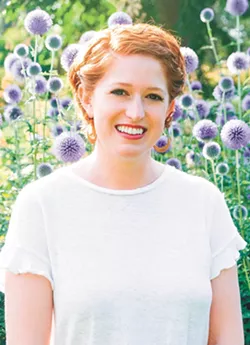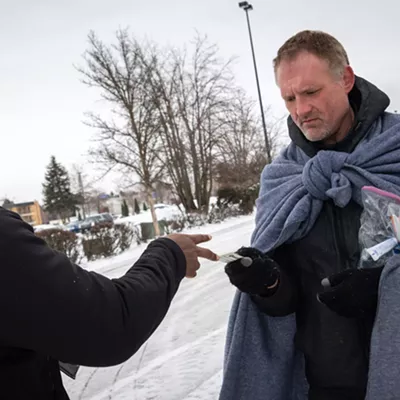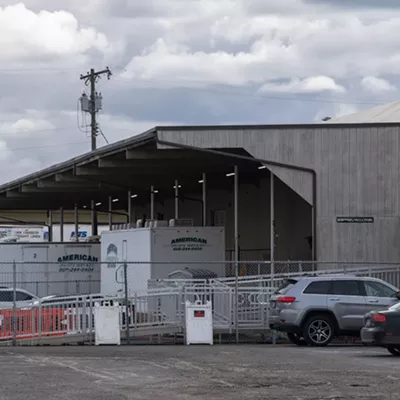The first night I started working in the temporary shelter at Catholic Charities, as one of my colleagues showed me the conference room that would soon house a dozen women for the night, she joked that we were getting ready for a sleepover.
I laughed but repeated this dubiously in my head: sleepover? It was hard for me to picture, as I stress-sweated through my shirt over the uncertainty of the night ahead. Two days earlier, in response to the coronavirus crisis, I'd been reassigned from my case manager position to graveyard shifts for emergency shelter services. All week, I'd panic-spiraled over the mounting spread of the virus and the newly issued stay-home order from the governor.
Leading up to check-in, as I waited for the room to fill, I was afraid of everything. I was afraid of everything I didn't know how to do yet, which ranged from knowing the correct ratio of water to bleach we mixed in the spray bottles for disinfecting, to knowing how to tell a patron to leave for disobeying rules. I was afraid of being exposed to the virus, though that risk always felt secondary, no matter what I was doing. More than anything, I was afraid of watching vulnerable people get sick, one after another, and being powerless to help.
But as the women filed in and arranged their belongings neatly beside their assigned mats, it seemed to be just another night for them. They settled down to eat the sack meal we'd provided. Some requested showers and waited for me to call their name from the list. Some colored or read or played games on their phones. Some fell asleep within the first hour, no doubt exhausted from a day spent outside. No one asked any questions about the coronavirus, or mentioned it in conversation.
This was, it turns out, how most of our patrons would experience coronavirus. Roughly six weeks later, we've been fortunate to still have no positive cases in our shelters. After we brought in a triage medical team to take patrons' temperatures and screen for symptoms every night, that quickly became a recognized step in their check-in process. From time to time, someone will snap about not being sick or roll their eyes at the thermometer. But for the most part, the threat of the coronavirus has simply become another part of our daily routine.
When our patrons appear in front of me to check in for the night, they are focused on meeting their basic human needs: food, sleep and shelter. And when they wake up in the morning, the first questions they usually ask are: "Did it rain last night?" or "How cold is it going to be today?" because for many of them, the weather will determine the outcome of their day.
Now, we're all in survival mode, all fearing for our lives and welfare, all imagining ourselves at risk every time we step outside our homes. But for those experiencing homelessness, who have no means of sheltering in place, survival was always their most urgent waking desire. Day by day, night by night, they face countless threats to their safety and health. The coronavirus may be catastrophic on a global scale, but it joins a long list of daily fears, such as a stranger jumping them for their cell phone, or their violent ex-boyfriend finding them, or freezing to death in the winter.
Survival is on my mind, too, when I'm at work, as I sip cold brew in the security office, my eyes flicking between the cameras monitoring the patrons' room and countless news articles. The graveyard shifts last from 7 pm to 7 am, and the long restless hours can lead me down dark passages in my mind. It's usually when 3 am hits that I start questioning not just how our sleeping patrons will survive this current health crisis, but also how they'll survive whatever comes next. In another six months, today's skyrocketing unemployment numbers could lead to more people living in poverty and more eviction notices, which means hundreds more people forced into homelessness and seeking shelter in Spokane. The fallout from the coronavirus, the oncoming tidal wave of human suffering and trauma, is what scares me most in these early hours.
One morning, I was so exhausted while disinfecting a doorknob, my eyes blurred with tears, because I'd be back in another 12 hours to do this again tonight, and again the next night, and even though logically I knew keeping doorknobs clean is an important step in reducing germ transference, the action felt endless and futile. In my sleep-deprived haze, cleaning the doorknob made me think: I am totally alone. We are all totally alone.
We've all embodied loneliness in our own ways during this time, even those of us with the privilege of stable housing and connection to friends and family. Confined to our homes, we're reaching out as best we can, and trying to find answers to seemingly unsolvable problems, and comfort for ourselves. The global onslaught of existential dread has led to this bone-deep fear that we're alone.
The women who stay in our shelter are never physically alone unless they are in the bathroom or the shower. But even then I'm close by, keeping track of time, giving them privacy while still reminding them that someone is always next in line. Sometimes, I'm sure, these women would prefer to be totally alone, at least for a few minutes. Sometimes, I'm sure, these women do feel totally alone, even in a crowded room, even with me here to fetch them ibuprofen or a tampon or an extra pair of socks. Sometimes, I'm sure, these women are awake at 3 am, like me, and are scared.
What brings me comfort is seeing that these women have, despite everything, a sense of community. If someone is new to Spokane or new to experiencing homelessness, here they will be swept under a wing and protected. The women share information about other shelters in town, bus schedules, medical clinics, laundry services and food pantries. They share extra food and clothing and blankets and cigarettes. They share advice about who to avoid and how to talk to each other, and try to manage conflict in the group, just as the staff does. In the moments when I accidentally interrupt a personal conversation, I hear one woman sharing her troubles, and the other respond that she will pray for her. This sense of community, sharing and giving to one another, existed before the crisis and will exist afterward. It is our human responsibility to take care of each other.
We have each other, I keep telling myself to ward off the 3 am thoughts. We always have each other. ♦
Maura Lammers is a case manager at Catholic Charities in Spokane. She earned an MFA in nonfiction writing from Eastern Washington University. Her work has previously appeared in the Masters Review, the Riveter, and the Modern Love column in the New York Times.





















